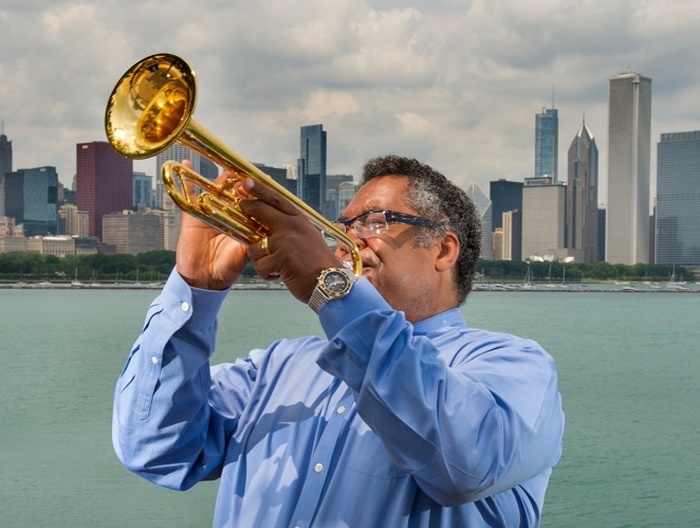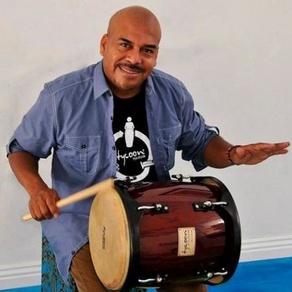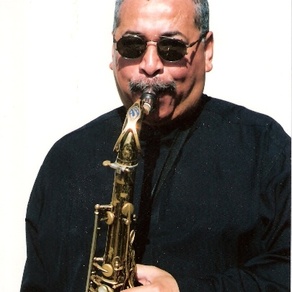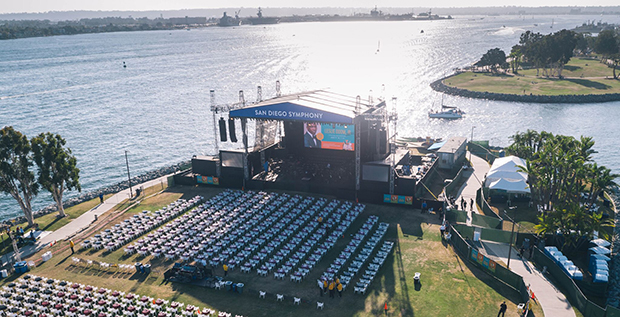Review: GODFATHERS OF LATIN JAZZ at San Diego Symphony Bayside Amphitheater

The San Diego Symphony's 2018 Bayside Jazz Series continued with "Godfathers of Latin Jazz," a concert inspired by trumpeter Dizzy Gillespie's merger of bebop and Afro-Cuban rhythms. Dizzy had wanted something new for a 1947 Carnegie Hall concert, "One of those tom toms" he said, thinking of the different hand-struck drums played by Latin percussionist Machito and others. To get the effect he wanted he added Cuban conguero Chano Pozo.
For the bayside concert, curator Gilbert Castellanos booked trumpeter Jon Faddis

and conguero Carlos "Charlie" Chavez to represent Gillespie and Pozo. Faddis fit especially well. He met Gillespie when he was 12 and later often performed with him, eventually going on to lead the Dizzy Gillespie 70th Birthday Big Band and the Dizzy Gillespie Alumni All-Stars. Gillespie once said of him, "He's the best ever, including me!" His protégé wouldn't have disappointed at this concert.
Faddis and Chavez were joined by Justo Almario on tenor saxophone and flute. The three main soloists were backed by the KSDS

Jazz Orchestra directed by Castellanos. The band opened and established its tight solid presence with "Tin Tin Deo," a tune cowritten by Pozo. The first solo went to Almario's flute, and his silvery liquid runs and Latin rhythms were a gentle pleasure. Local baritone saxophonist JP Balmat followed and was just establishing a good funky blues groove when his mic cut out making most of his fairly long solo inaudible over the backing rhythm section. After more from the full band and Almario (with mic), the flutist's closing duet with Chavez added a playful exclamation point.
A concert honoring Gillespie and Pozo would have been incomplete without "Cubana Be, Cubana Bop," a tune cowritten by Gillespie to showcase Pozo's conga drums and chants. After a long Latin percussion intro the band roared a brash trumpet-heavy "Bop" style. In Gillepie's recordings of the piece Pozo pushes aggressively from the opening bars, matching the intensity of the following ensemble. Chavez had a longer, more sophisticated entry before pushing the tempo. It was an impressive display of skill, but Pozo's immediately energetic approach would have been better at grabbing audience attention.
Guest star Jon Faddis appeared for the first time on "Tanga" by Afro-Cuban music icon Mario Bauza. It was the only piece on the program neither Gillespie nor Pozo had a hand in writing. Faddis used a mute for solos on "Tanga' and the following happy medium tempo "Fiesta Mojo." He immediately demonstrated why Gillespie admired
-640x0.jpg)
his playing - beautiful tone, effortless control and technique at any speed, and a gift for melodic improvisation. His power and talent for high notes came to the fore in "Things to Come," a piece of in-your-face flashy big-band bebop Dizzy wrote to shock the jazz establishment with new harmonies and reckless speed. Castellanos, also a Gillespie protégé, had an admiring grin on his face that said it all as he watched Faddis play.
"Manteca" by Dizzy and Pozo opened the second set and proved a wild workout for the four trumpets of the KSDS band. The virtuoso display began when eight-bar solo shots for each went around a few times, then became more frantic as the length switched to fours, then twos.
An arrangement for just rhythm section, flute and muted trumpet of "Con Alma," Dizzy's most beautiful tune, calmed things down. Almario and Faddis were at their melodic best.
An exciting extended version of "Night in Tunisia" by Dizzy and his wife Lorraine closed the concert and offered trombones and saxophones their first big chunk of spotlight. Alto-sax player Charlie Arbelaez, one of the band's best soloists, went for laughs and got them by abruptly stopping several of his brief solo spots without completing promising lines. Any doubt that he was playing around was removed by a sly grin and the virtuosic fountain of bebop melodies he exploded with during his last turn at the plate.
The clowning around wasn't out of place. When introducing tunes, Jon Faddis's relaxed playful stage presence showed he'd learned something from both Gillespie's trumpet playing and creative comedic asides.
Faddis is the second of Dizzy Gillespie's protégés to be booked by Castellanos this season. Arturo Sandoval, the other, entertained a large appreciative crowd two weeks ago with a sextet that often had a more prominent swinging Latin flavor than Faddis in a big-band setting. It's more difficult to get the balance between jazz and Latin with a much larger band, and Chavez's congas sometimes disappeared below an over-miced bass and excellent, but aggressive, jazz drumming. Though the concert was advertised as "Godfathers of Latin Jazz," the result seemed more likely to appeal to those who dig mainstream jazz, big bands and a ton of impressive trumpet solos.

For information about other concerts scheduled in the Bayside Series visit the Symphony website.
Photos courtesy San Diego Symphony.
Reader Reviews

Videos
